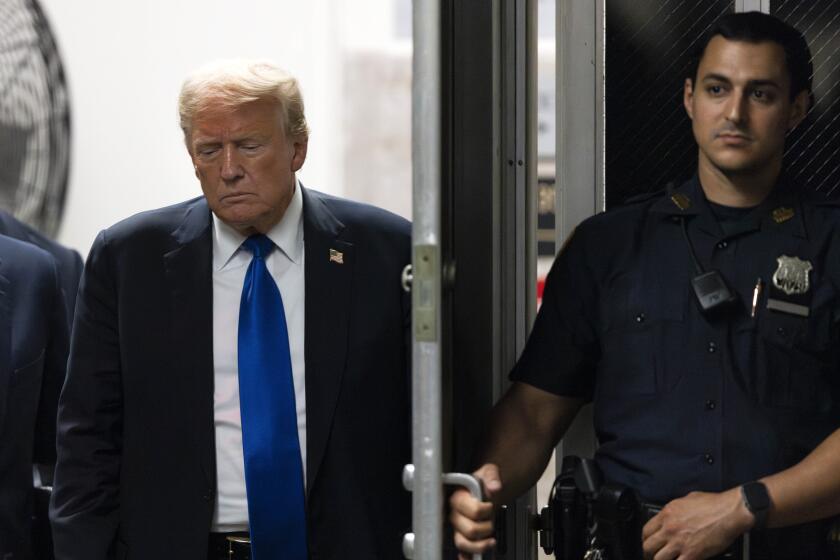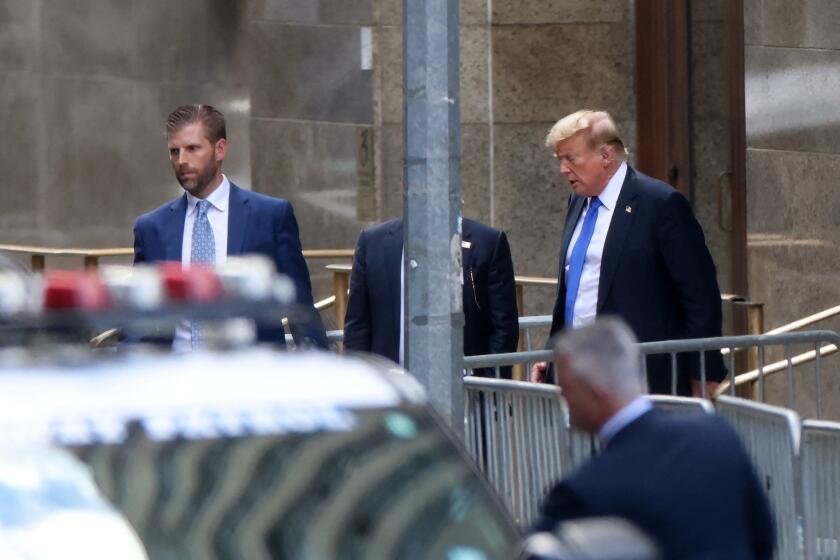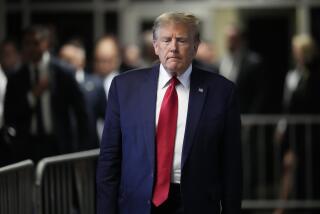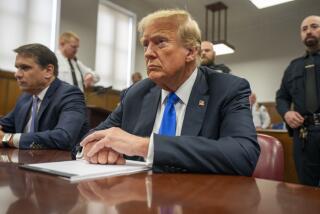What verdict will voters render after jury finds Trump guilty in hush money case?

- Share via
The sometimes-breathless gavel-to-gavel coverage of former President Trump’s trial was no surprise, as a singularly divisive figure sat for more than a month at the defense table, the first president to face criminal charges and the possibility of a trip to jail.
But for all the trial’s spectacle, many political observers predict that the impact of Thursday’s 34 guilty verdicts will be muted and unlikely to change the dynamic in a presidential race that appears extremely close, just over five months before the last day of voting.
The New York jury’s verdict puts Trump in an unprecedented position: trying to win the White House as a felon, guilty of falsifying business records to bury the details of his extramarital one-night stand with a porn star.
While a Trump appeal could still remove the threat of probation or jail, he still will have to explain to voters why a man convicted of a political cover-up should be entrusted with the most powerful office in the world.
Jurors deliberated for 9½ hours over two days before convicting former President Trump of all 34 counts he faced in a hush-money scheme surrounding the 2016 election.
Trump has provoked both admiration and despair — depending on the audience’s political leanings — with his ability to survive what some judged to be fatal missteps.
“I already gave up my membership in the He-Certainly-Can’t-Survive-This Club,” David Axelrod, the top strategist in Barack Obama’s two successful presidential campaigns, said in an interview. “Look at how many other times he has gotten away with things. He is an extraordinary escape artist.” (Axelrod and other experts spoke before the verdict.)
In 2016, candidate Trump famously told a campaign crowd that he could stand in the middle of Fifth Avenue in New York and shoot someone without losing his core supporters. Though the charges in the hush money case fell short of assault with a deadly weapon, they stand as a real-world test of Trump’s seeming invulnerability from political norms.
I already gave up my membership in the He-Certainly-Can’t-Survive-This Club
— David Axelrod
With about a month to go in the 2016 race, a previously secret video showed Trump boasting about his ability to sexually prey on women because of his fame. Many observers believed the “Access Hollywood” recording effectively killed his chances of winning the presidency. But Trump overtook front-runner Hillary Clinton in the final weeks of the race and won the presidency.
When Trump was thrown out by voters in 2020 in favor of Joe Biden, some pundits again predicted Trump’s days were numbered. But he pushed aside all his Republican primary challengers this year, despite a pair of legal setbacks: a jury verdict that found him liable for sexually abusing advice columnist E. Jean Carroll in 1996 and a judge’s order to pay a $454-million penalty for falsely inflating the value of his real estate empire.
Trump’s conviction plays out at a time when Americans are deeply divided, a fracture exacerbated by a sharply fragmented information ecosystem. Mainstream outlets parsed the detailed evidence presented by prosecutors in the trial, while right-leaning outlets bolstered Trump’s claims that the charges amounted to a political hit job by Democratic prosecutors.
After closing arguments Tuesday, one Newsmax cable television commentator suggested that the evidence in the case pointed to crimes — not by Trump but by Stormy Daniels, who testified she had sex with Trump in 2006, and by prosecution witness Michael Cohen, Trump’s former lawyer, who testified he helped facilitate the payments to keep Daniels quiet about the one-night stand.
A Marquette Law School Poll completed in mid-May suggested the verdict might have some effect on the presidential race.
When a national sample of voters was presented with the possibility that Trump would be found guilty in the New York case, 43% said they would vote for Biden, 38% would vote for Trump and 18% said they would vote for someone else or remained undecided.
Presented with the opposite outcome, Trump being acquitted, the survey tipped in his favor, with voters preferring him by 44% to 38% over Biden. Again, 18% favored another candidate or were undecided.
But both those results fall within the margin of error of more than 6%, said Charles Franklin, director of the Wisconsin-based poll. And previous experience suggests that public opinion about the hush money case might have been well settled for many voters long before the verdict, because the facts had been aired for many months, Franklin said.
Trump guilty: Despite the former president’s felony conviction in his hush money trial, many voters will react to the jury decision with a shrug.
Franklin compared the long run-up to the verdict with the prolonged public debate that occurred during Trump’s first impeachment, when the onetime reality TV host was accused of soliciting foreign interference in a bid to help win the 2020 election.
“As the House considered the impeachment, then voted to impeach him and then the Senate voted to acquit him, the public’s views [of Trump] and of the impeachment and then of the conviction didn’t change,” Franklin said.
He predicted that future surveys about this week’s trial verdict were likely to show only a modest shift in voter sentiments.
Charles Cook, a nonpartisan political analyst based in Washington, agreed that it was hard to imagine the verdict swaying many voters.
“Swing voters, particularly the ‘pure independents’ who don’t lean to either party, tend to be driven by other issues and have other priorities in mind when making their decisions to vote,” Cook said via email. He said that the small group of voters who do not have hardened views on the 2024 race “don’t follow current events that much, believe all politicians and political parties are corrupt and are not particularly moved by this.”
The thought that Trump might entirely escape the wrath of voters seemed unfathomable to some.
“At some point, there is going to have to be a discussion of whether we want a liar and a convict in the Oval Office,” said Ben Austin, a Los Angeles Democrat who worked in President Clinton’s White House. “I mean, what kind of country are we?”
Reed Galen, a lifelong Republican who left the party and co-founded the anti-Trump Lincoln Project, wondered if GOP voters who once favored former South Carolina Gov. Nikki Haley might be put off by the revelations from the hush money case.
“Some of them were already highly skeptical of Trump, and this might take them off Trump Island, hopefully once and for all,” Galen said.
Donald Trump faces multiple criminal charges, but a conviction would not legally prevent him from serving as president — in theory, even from jail.
But Trump stalwarts say his detractors should have long ago recognized that he is impervious to critiques by mainstream media outlets and old-guard Republicans. Even those who have accepted that Trump is a flawed candidate said they find him preferable in a country they are convinced is going the wrong way under President Biden.
“By now, a lot of Arizonans are just numb to the trial and all of this,” said Stan Barnes, a Republican who runs a public affairs and lobbying firm in the battleground state. “They’re a lot more focused on what kind of policies they want from the president. When Trump was in the White House, mortgage rates were [as low as] 2½%, unemployment was [low]. And the southern border felt secure.”
Barnes said nothing that happened in the Manhattan courtroom would change those views, predicting that many Americans will be ready to vote again to promote Trump and his “America first” agenda.
More to Read
Get the L.A. Times Politics newsletter
Deeply reported insights into legislation, politics and policy from Sacramento, Washington and beyond. In your inbox three times per week.
You may occasionally receive promotional content from the Los Angeles Times.














